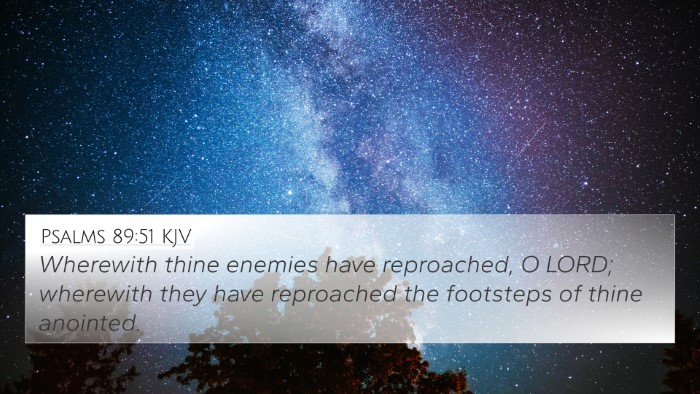Psalms 44:13 - Meaning and Interpretation
Psalms 44:13 reads: "You made us a byword among the nations; a laughingstock among the peoples." This verse expresses a profound sense of humiliation and distress experienced by the psalmist and the nation of Israel. The sentiment captured here is one of anguish, reflecting on the social and spiritual repercussions that come from a perceived abandonment by God.
Combined Insights from Public Domain Commentaries
This verse has been interpreted through various historical and theological lenses. Notable commentaries by Matthew Henry, Albert Barnes, and Adam Clarke provide rich insights that uncover layered meanings:
- Matthew Henry: Henry emphasizes the depth of Israel's suffering, noting that to be made a "byword" signifies the loss of dignity and the reproach Israel receives from surrounding nations. It illustrates how God’s people endure mocking and derision when they stray from their covenant with Him.
- Albert Barnes: Barnes articulates that this verse is a lament both of national disgrace and divine abandonment. He suggests that this symbolizes the trials that the people went through, which led to their downfall and ridicule by the enemies. This mockery serves as a reminder of their fallen state and urges a return to faithfulness.
- Adam Clarke: Clarke offers a historical view, reflecting on the times when Israel faced invasions and conquests, which rendered them subjects of jokes among the nations. He connects this humiliation to a broader narrative of suffering that is often present in the life of God's people when they deviate from His commandments.
Contextual Understanding of Psalms 44:13
The context of Psalms 44 reveals a cry for help from a community that feels forsaken despite previous victories attributed to divine intervention. This verse highlights the painful irony that, in their distress, they have become a spectacle to others. It also embodies a significant inter-Biblical dialogue where themes of corporate guilt, shame, and a call for restoration are prominent.
Bible Cross-References
The understanding of Psalms 44:13 can be enriched by cross-referencing it with several related scriptures that resonate with its themes of suffering, disgrace, and divine silence:
- Deuteronomy 28:37: "You shall become an astonishment, a proverb, and a byword among all nations where the Lord will drive you." This passage highlights warning consequences for disobedience.
- Isaiah 53:3: "He was despised and rejected by mankind, a man of suffering, and familiar with pain." This verse parallels the mockery described in Psalms 44:13 with the suffering of the Messiah.
- Psalm 69:10-12: "When I wept and humbled my soul with fasting, it became my reproach." This verse echoes the theme of humiliation and seeking God during times of despair.
- Jeremiah 20:7: "O Lord, you deceived me, and I was deceived; you overpowered me and prevailed." This verse captures the feeling of betrayal and public scorn similar to that in Psalms 44.
- Lamentations 3:14: "I have become the laughingstock of all my people; they mock me in song all day long." This verse directly reflects the anguish of being a "byword."
- Matthew 10:25: "It is enough for students to be like their teachers, and servants like their masters. If the head of the house has been called Beelzebul, how much more the members of his household!" This verse highlights the shared experience of mockery for those who follow God.
- 1 Peter 4:14: "If you are insulted because of the name of Christ, you are blessed, for the Spirit of glory and of God rests on you." This New Testament perspective provides hope amid ridicule.
- Romans 8:36: "As it is written: 'For your sake we face death all day long; we are considered as sheep to be slaughtered.'" This verse reflects on the identity as God's people in the face of opposition.
- Hebrews 11:36-37: "Some faced jeers and flogging, and even chains and imprisonment. They were stoned; they were sawed in two; they were put to death by the sword." This passage illustrates the suffering of those who remain faithful amid cruelty.
Insights on Thematic Bible Verse Connections
In considering thematic Bible verse connections, Psalms 44:13 aligns with overarching themes of suffering for righteousness, the communal nature of adversity among God's people, and the sorrowful acknowledgment of divine distance during trials. This encourages believers to grasp the reality that trials can serve as both a test of faith and a means of drawing nearer to God.
How to Use Bible Cross-References
Exploring the complex relationship and similarities between Psalms 44:13 and other scripture can deepen one's comprehension of the text. Here are tools and methods for effective Bible cross-referencing:
- Bible Concordance: Utilize a concordance to find verses that contain similar themes words, such as “insult” or “mockery.”
- Bible Cross-Reference Guide: Many Bibles provide footnotes or annotations that link passages for deeper study.
- Cross-reference Bible Study: Engage in study groups that discuss connections between verses, offering perspectives and insights to enrich understanding.
- How to Find Cross-References in the Bible: Look for themes and keywords that are repeated throughout scripture to identify interconnections.
- Bible Reference Resources: Explore resource books or online platforms designed for linking Bible scriptures.
Conclusion
Psalms 44:13 serves as a poignant reminder of the trials faced by the people of God and the significance of understanding these moments through historical and theological reflections. By studying this verse with its cross-references, one gains a powerful insight into the experiences of suffering that strengthen faith and deepen an understanding of God's presence in difficult times.
Utilizing cross-referencing Biblical texts not only illuminates the connections between different parts of the Scriptures but also serves as a guide to understanding the persistent themes of God's faithfulness, even amid despair and ridicule.











